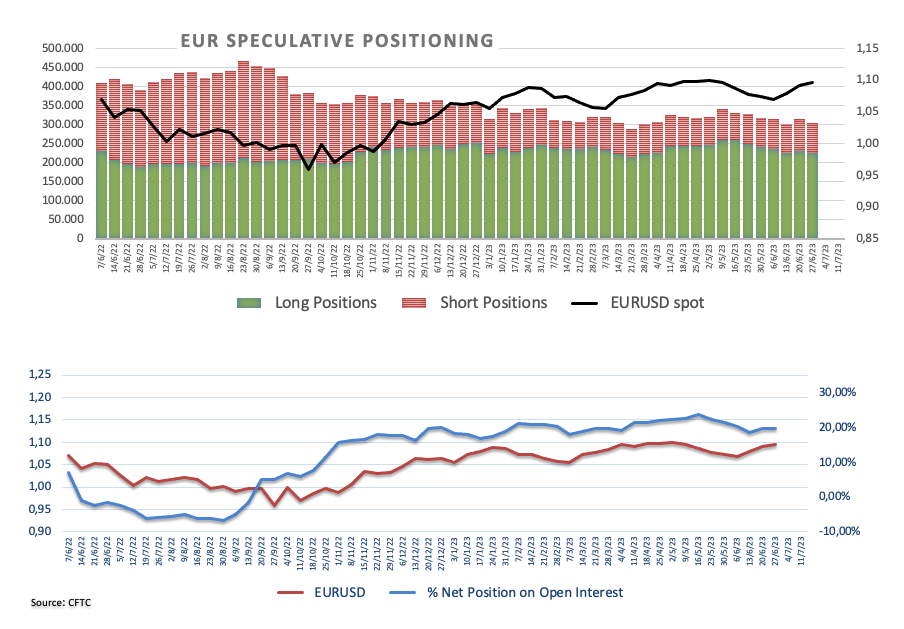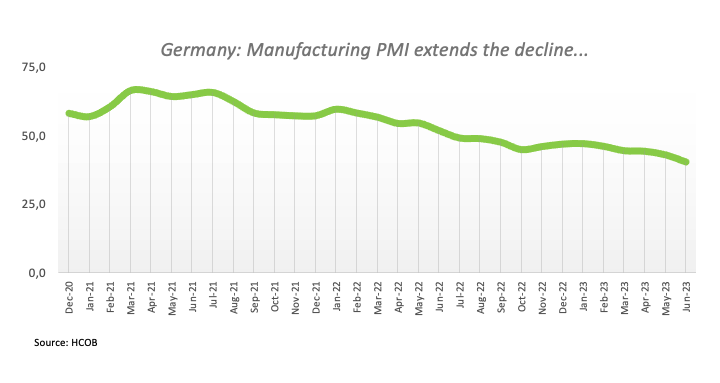- Analytics
- News and Tools
- Market News
- Euro weakens to daily lows and returns to the sub-1.0900 region ahead of key data
Euro weakens to daily lows and returns to the sub-1.0900 region ahead of key data
- Euro kicks in the week on the back foot on US Dollar recovery.
- Stocks in Europe open the week within tight ranges.
- EUR/USD slips back below the 1.0900 support on Monday.
- Final Manufacturing PMIs take centre stage later in the session.
- US ISM Manufacturing PMI will be in the limelight in NA trading hours.
At the start of the new trading week, the Euro (EUR) is under noticeable pressure, retracing part of Friday's strong gains and forcing EUR/USD to drop below the key support level of 1.0900 the figure.
Meanwhile, the US Dollar (USD) is showing a better performance, with the USD Index (DXY) gaining renewed strength and surpassing the key level of 103.00, despite the lack of direction in US yields on Monday.
The potential future actions of the Federal Reserve and the European Central Bank (ECB) in normalizing their monetary policies remain a topic of ongoing debate amidst increasing speculation about an economic slowdown on both sides of the Atlantic. Currently, bets remain firm that there will be a 25 basis point rate increase by both central banks at their meetings in July.
Looking at the latest CFTC Positioning Report, net longs in EUR remained steady and reached a 2-week high of around 145K contracts in the week ending June 27, despite the spot reaching new monthly highs above 1.1000, which ultimately fizzled out due to the recovery in the risk-off trade and buying interest in the USD.

In terms of economic data, the final Manufacturing PMI figures for the euro area and Germany in June were 43.4 and 40.6, respectively.

Meanwhile, in the US, the ISM Manufacturing PMI will be the centre of attention, alongside the final S&P Global Manufacturing PMI and Construction Spending.
Daily digest market movers: Euro appears offered amidst US Dollar gains
- The EUR reverses course and retreats to the sub-1.0900 zone.
- US markets face a shortened trading week due to Independence Day.
- Chinese Caixin Manufacturing PMI failed to surprised markets.
- The probability of a Fed rate hike is near 88%.
Technical Analysis: Euro could revisit the 100-day SMA
EUR/USD appears under pressure and risks a potential deeper drop in case the selling bias picks up pace. That said, the loss of the weekly low at 1.0835 (June 30) could open the door to a test of the interim 100-day SMA at 1.0819. The breakdown of the latter should meet the next contention area not before the May low of 1.0635 (May 31) ahead of the March low of 1.0516 (March 15) and the 2023 low of 1.0481 (January 6).
If bulls regains the upper hand, the next hurdle is then expected at the June peak of 1.1012 (June 22) prior to the 2023 high of 1.1095 (April 26), which is closely followed by the round level of 1.1100. North from here emerges the weekly top of 1.1184 (March 31, 2022), which is supported by the 200-week SMA at 1.1181, just before another round level at 1.1200.
The constructive view of EUR/USD appears unchanged as long as the pair trades above the crucial 200-day SMA, today at 1.0595.
Euro FAQs
What is the Euro?
The Euro is the currency for the 20 European Union countries that belong to the Eurozone. It is the second most heavily traded currency in the world behind the US Dollar. In 2022, it accounted for 31% of all foreign exchange transactions, with an average daily turnover of over $2.2 trillion a day.
EUR/USD is the most heavily traded currency pair in the world, accounting for an estimated 30% off all transactions, followed by EUR/JPY (4%), EUR/GBP (3%) and EUR/AUD (2%).
What is the ECB and how does it impact the Euro?
The European Central Bank (ECB) in Frankfurt, Germany, is the reserve bank for the Eurozone. The ECB sets interest rates and manages monetary policy.
The ECB’s primary mandate is to maintain price stability, which means either controlling inflation or stimulating growth. Its primary tool is the raising or lowering of interest rates. Relatively high interest rates – or the expectation of higher rates – will usually benefit the Euro and vice versa.
The ECB Governing Council makes monetary policy decisions at meetings held eight times a year. Decisions are made by heads of the Eurozone national banks and six permanent members, including the President of the ECB, Christine Lagarde.
How does inflation data impact the value of the Euro?
Eurozone inflation data, measured by the Harmonized Index of Consumer Prices (HICP), is an important econometric for the Euro. If inflation rises more than expected, especially if above the ECB’s 2% target, it obliges the ECB to raise interest rates to bring it back under control.
Relatively high interest rates compared to its counterparts will usually benefit the Euro, as it makes the region more attractive as a place for global investors to park their money.
How does economic data influence the value of the Euro?
Data releases gauge the health of the economy and can impact on the Euro. Indicators such as GDP, Manufacturing and Services PMIs, employment, and consumer sentiment surveys can all influence the direction of the single currency.
A strong economy is good for the Euro. Not only does it attract more foreign investment but it may encourage the ECB to put up interest rates, which will directly strengthen the Euro. Otherwise, if economic data is weak, the Euro is likely to fall.
Economic data for the four largest economies in the euro area (Germany, France, Italy and Spain) are especially significant, as they account for 75% of the Eurozone’s economy.
How does the Trade Balance impact the Euro?
Another significant data release for the Euro is the Trade Balance. This indicator measures the difference between what a country earns from its exports and what it spends on imports over a given period.
If a country produces highly sought after exports then its currency will gain in value purely from the extra demand created from foreign buyers seeking to purchase these goods. Therefore, a positive net Trade Balance strengthens a currency and vice versa for a negative balance.
© 2000-2026. All rights reserved.
This site is managed by Teletrade D.J. LLC 2351 LLC 2022 (Euro House, Richmond Hill Road, Kingstown, VC0100, St. Vincent and the Grenadines).
The information on this website is for informational purposes only and does not constitute any investment advice.
The company does not serve or provide services to customers who are residents of the US, Canada, Iran, The Democratic People's Republic of Korea, Yemen and FATF blacklisted countries.
Making transactions on financial markets with marginal financial instruments opens up wide possibilities and allows investors who are willing to take risks to earn high profits, carrying a potentially high risk of losses at the same time. Therefore you should responsibly approach the issue of choosing the appropriate investment strategy, taking the available resources into account, before starting trading.
Use of the information: full or partial use of materials from this website must always be referenced to TeleTrade as the source of information. Use of the materials on the Internet must be accompanied by a hyperlink to teletrade.org. Automatic import of materials and information from this website is prohibited.
Please contact our PR department if you have any questions or need assistance at pr@teletrade.global.















